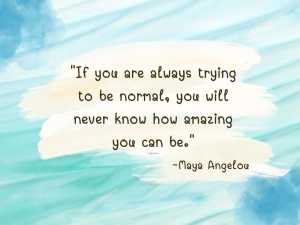Let Them Be Weird: Letting Our Kids Be Themselves
Anyone who is parenting or has parented toddlers knows the feeling of seeing your kid do something really weird and feeling embarrassed that people are watching. My youngest is a constant case of this. She walks around clucking like a chicken, dips graham crackers and fruit in ketchup, and talks to herself as she twirls around Target. She will walk up to you and rawr in your face pretending to be a dinosaur, or she will take utensils out of the dishwasher one at a time to distribute randomly around the house. Her weirdness is what I love most about her and actually, what I am most proud of because even at two and a half, she is unapologetically herself.

Somewhere along the way, our kids lose their confidence to be 100% themselves, and I think that happens after we’ve told them to stop doing the weird things so many times that they are afraid to be themselves. I see this in my teenage students. Yes, I want to throw up every time my child dips something in ketchup that should never go anywhere near ketchup, but she’s exploring and doing something that she figured out on her own instead of relying on the things I’ve shown her specifically how to do. I, and probably so many other adults, need to remember that when our kids are weird, it means they feel safe to be themselves.
So let them be weird.
Let them dip strawberries in ketchup even if that makes you gag to watch – they may end up being world-renowned chefs or adventurous cake decorators.
Let them sit in a pile of dirt and paint their legs – they may end up being archaeologists or famous artists.
Let them cluck like a chicken or roar like a lion – they may end up being actors or storybook writers.
Let them collect pieces of tissue paper and ribbon scraps and create doll beds in their windows – they may end up being doctors or nurses or foster parents who care for those who need extra love.
Adults have a tendency to comment about or correct kids when they do weird things. Oftentimes, when my two year old is dipping something in ketchup that should never be dipped in ketchup, I hear another adult telling her “Eww gross” or “Don’t do that!” Probably the hardest part of letting our kids be weird is getting other people to back off correcting them. So when that happens, the only thing I say is “Let her be weird. It’s how she learns.” If you find yourself with a similar experience, that’s all we need to say. Let them be weird.
Let them put on random costume pieces and noise cancelling headphones just to eat dinner or play leap-frog with their sister halfway across City Park or hang upside down on the sofa while watching Bluey or any other thing you laugh off as weird – they just may end up changing the world because no one stopped them from doing the weird things they wanted when they were little which allowed them to gain confidence in who they are and the things that interest them and made them believe they could be or do anything. Sometimes, it’s their weirdness that helps them change the world.















This is a FABULOUS article! My son unapologetically dips meatballs in powdered sugar. He likes them this way. You are 100% correct. Those who rule the world aren’t the straight A, “normal” kids. They are the ones willing to take risks and be confident in themselves, never questioning whether that decision is the “right” one or the “most accepted one.” Thank you for writing this.